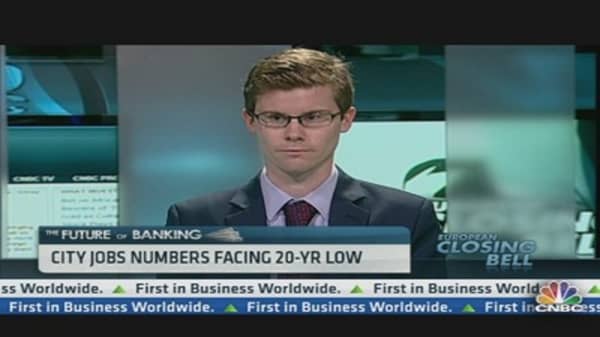Banking jobs in the City of London, the business and financial center of the U.K., will fall next year and drop even further in 2014, reaching their lowest level since 1993, according to a report by the Centre for Economics and Business Research.
The think tank expects jobs to fall by 13,000 to 237,000 in 2013, a steep drop from the 354,000 jobs that existed in 2007.
"Since the financial crisis there's been a new normal of very low economic growth in the U.K., the euro zone, and even the U.S. and around the world," Rob Harbron, economist at CEBR, told CNBC. He noted that this was adversely affecting "activity levels, turnover, and subsequently productivity."
In the report, CEBR Chief Executive Douglas McWilliams said: "The fall in activity is partly a function of the weak economy, partly a hangover effect from the financial crisis, and partly caused by increasing regulation which limits access to bank cash to bankroll financial transactions. The business model for many firms in the City – which was based on taking a percentage from yields of 8 percent plus – has to change in a world where low yields are likely for many years to come."
Though bleak, this report is perhaps not so surprising, as it comes on the heels of major announcements of downsizing in the bank sector.
UBS recently announced plans to cut 10,000 jobsafter it decided to slim down its trading activities. Many of these job cuts, which will eliminate 16 percent of UBS's 64,000 employees over the next three years, will take effect in the London office.
Additionally, London-based HSBC revealed it has reduced its number of staff by almost 30,000 in the last two years.
The Royal Bank of Scotland (RBS), too, is not immune from sweeping cuts within the industry, as its London branches are set to incur a large portion of the bank's proposed 3,800 job cuts.
Developments like these account for the downward revision in CEBR's report, which initially estimated there would be 256,000 City jobs in 2013, but reduced this figure by 19,000 in the last six months.
The outlook for industry-wide cutbacks does not look promising, as CEBR eventually expects the trend to stabilize but not reverse course for quite some time.
Harbron warned: "By 2014-15 we expect cuts not to be happening anymore, but we don't really expect any strong growth to return [until] 2017."



